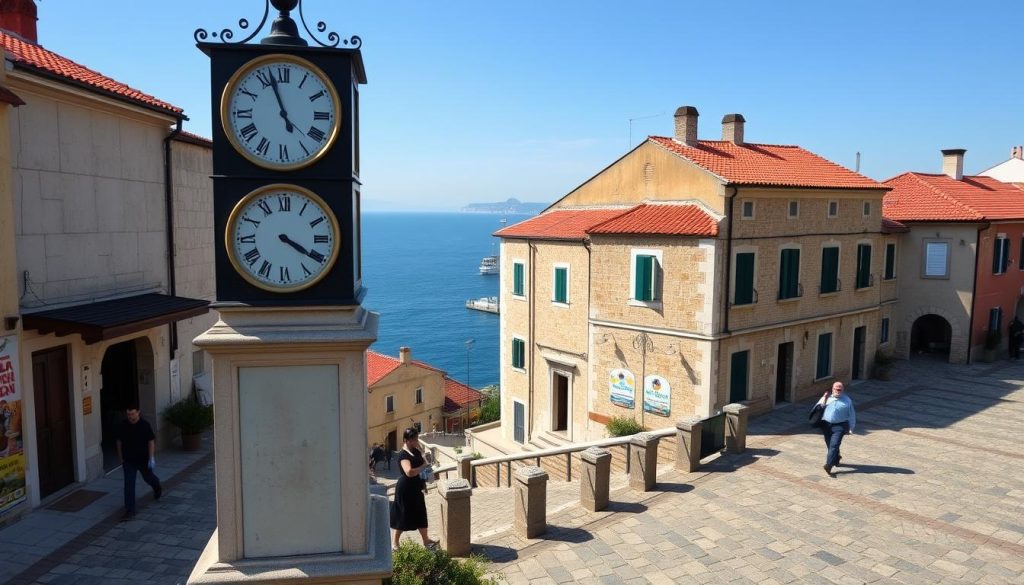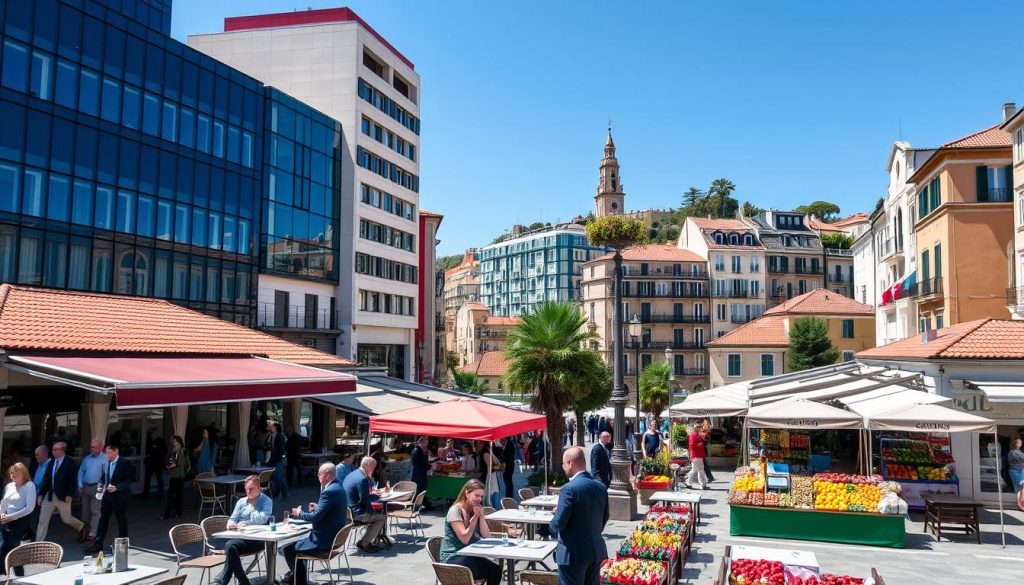The business culture in Croatia shows its rich history and varied influences. It’s key for foreign investors and companies to understand the local customs and values. Knowing these can greatly improve how you work together, leading to better business results.
Learning about Croatian business culture helps you navigate the market more easily. It also builds strong relationships, which are crucial for success in this region.
The Importance of Business Culture in Croatia

Business culture in Croatia is very important. It shapes how companies work and interact. Knowing this culture helps improve communication and builds strong partnerships.
It’s key for success in business. It helps companies deal with challenges better.
Understanding business culture leads to better negotiation. It helps people respect cultural differences. This makes working together easier.
Business culture in Croatia includes respect for hierarchy and personal relationships. It also values integrity. These values are crucial for success.
Business culture affects team dynamics in Croatian companies. Knowing local customs makes the work environment better. This boosts productivity and innovation.
Grasping the importance of business culture is vital. It helps companies succeed and grow in a competitive world.
Key Characteristics of Croatian Business Culture

The Croatian business culture is a mix of old and new ways of working. It shows how people interact in different work settings. Building personal relationships is key, as trust and knowing each other well are vital for strong business ties.
Face-to-face talks are often preferred. This shows a cultural love for creating bonds through direct chats rather than digital means. Talking personally helps understand each other’s aims better, leading to better teamwork.
History has shaped today’s work norms in Croatia. Old social and economic setups still influence workplaces. Many companies stick to a strict hierarchy, showing respect for those in charge.
In short, Croatian business culture values personal bonds, prefers face-to-face talks, and is influenced by history. Knowing these traits is crucial for success in the Croatian business world.
Business Etiquette in Croatia

Knowing how to act in Croatian business settings is key. It’s about making a good first impression with professional greetings and dressing right. Also, how you greet and introduce yourself matters a lot.
Greetings and Introductions
In Croatia, saying hello is very important. When you meet someone for the first time, a firm handshake and direct eye contact are expected. Always use titles and last names at first, showing respect for hierarchy.
Starting with small talk before business matters helps build a connection. It makes your interactions more personal and meaningful.
Appropriate Dress Code
Dressing properly is crucial in Croatian business. Men usually wear suits and ties, while women choose tailored dresses or professional suits. It’s important to look neat and presentable.
Wearing the right clothes shows you’re professional and respectful. Following these guidelines can greatly improve your reputation in Croatian business.
Communication Styles in Croatian Business

Effective communication is key in Croatian business. The main style is direct, focusing on clear and straightforward talks. When talking to Croatians, expect them to get to the point quickly. This helps avoid confusion and misunderstandings.
However, indirect communication is also used, especially when being diplomatic or building relationships. Knowing when to use direct or indirect communication is important. It can greatly affect the success of your talks.
Non-verbal signs like gestures, facial expressions, and body language are very important. Understanding these cultural signs helps in building good relationships. For example, eye contact shows confidence and sincerity. A relaxed posture can make you seem more approachable.
- Direct communication emphasises clarity and purpose.
- Indirect communication may reflect a desire for harmony.
- Non-verbal cues enhance meaning and intent.
- Cultural nuances shape perceptions and responses.
By understanding these different communication styles, professionals can do better in Croatian business. They can make sure their messages are understood well and build strong professional ties.
Building Relationships in Business

In Croatia, building strong relationships is crucial for business success. Good connections make dealings easier and build trust. The way people interact in Croatia is key to lasting partnerships.
The Role of Trust and Loyalty
Trust is the base of business relationships in Croatia. It takes time and regular contact to build. Loyalty is also vital; relationships that don’t grow can’t last. Here’s how to build trust and loyalty:
- Communicate clearly and openly.
- Be dependable and keep your promises.
- Show you care about your colleagues’ well-being.
Networking Opportunities
Networking in Croatia offers many chances to grow your professional circle. Industry events are great for meeting potential partners. Personal connections can also lead to new business opportunities. Here are some tips for better networking:
- Go to local trade fairs and seminars.
- Join groups related to your field.
- Use social media to connect with professionals.
Decision-Making Process in Croatian Companies

In Croatian companies, decision-making blends old values with new ways. Everyone works together to make decisions. This teamwork is key to success.
- Collective input is sought, encouraging dialogue among team members.
- Senior management typically guides the process, but contributions from all levels are appreciated.
- Trust and relationship-building are essential components, allowing for open discussions on significant matters.
The role of corporate hierarchy is clear in Croatia. Seniority guides decision-making. This approach values the wisdom of experienced leaders while keeping everyone involved.
Foreign businesses can benefit from understanding these dynamics. Adapting to Croatian culture helps in teamwork and building strong partnerships. This is the key to success in the Croatian market.
Understanding Hierarchy and Authority

The Croatian corporate hierarchy is key in shaping work life and how well teams work together. Knowing who has authority in Croatian companies is vital for good business relationships. Seniority in business also plays a big role in making decisions and how people communicate.
The Role of Seniority in Business Settings
Seniority has a big impact on Croatian companies. Those in charge have a lot of say in what projects get done and big decisions. The value of experience is big in Croatian business culture. This helps teams work better together.
- Leaders use their experience to help and guide younger team members.
- Big decisions usually come from the top, with senior managers making the final call.
- There’s a formal way of talking to those in charge, especially the seniors.
Getting how seniority and hierarchy work in Croatia is important for success. Navigating these structures well can improve teamwork and professional relationships.
Business Culture in Croatia

Croatian business culture is a mix of old traditions and new values. It shapes how people work together. This mix makes professional attitudes in Croatia stand out compared to Western ways.
The influence of Yugoslavia and the shift to a market economy is clear. This history brings a unique blend of formality and friendliness to business.
- Respect for hierarchy and authority remains prevalent.
- Building personal relationships is crucial for successful collaboration.
- Negotiation often involves patience and thorough discussions.
For business professionals, understanding these points is key. Knowing the cultural nuances can improve communication and lead to strong partnerships.
Time Management and Punctuality

In Croatia, being on time is key in business. Showing up on schedule shows you’re professional and respect others’ time. Croatian business people stick to their schedules tightly, seeing time as precious.
They view time as something valuable, which shapes how they plan meetings. For example, they often book meetings early and expect everyone to stick to the plan.
- Being late can be seen as a sign of disrespect.
- Meetings start right on time.
- They plan meetings with clear agendas to make them productive.
Knowing these time management habits is crucial for building strong business ties in Croatia. Using good time management can really help improve your work relationships and create a positive work atmosphere.
Cultural Differences and Sensitivities

It’s key to understand cultural practices for successful business in Croatia. The country’s rich history and diverse influences make its business scene unique. Cultural sensitivity is crucial here.
When working with Croatian partners, it’s important to respect local customs. This shows respect and builds strong relationships. Here are some things to remember:
- Be aware of communication styles and non-verbal cues.
- Personal relationships are important in business.
- Regional customs and practices can vary.
Showing cultural sensitivity in Croatia helps avoid misunderstandings. Talking openly about any doubts can increase respect between parties.
Negotiation Styles in Croatia

Negotiation in Croatia has its own unique styles and strategies. These reflect the country’s culture and business environment. It’s key to understand these approaches for successful business talks.
Being well-prepared is crucial. Croatian negotiators value thoroughness and professionalism. Having a solid strategy can greatly impact the outcome.
Relationships are very important in Croatian negotiations. Building trust and respect is essential for successful deals. Getting to know your counterparts personally can help a lot.
Formality is also a big deal. Many negotiations start with formalities. It’s wise to keep professionalism throughout, including proper etiquette in communication and decision-making.
- Understand the local context before entering negotiations.
- Focus on relationship-building alongside negotiation tactics.
- Be prepared for formal proceedings that respect traditions.
By adopting these negotiation styles, foreign businesses can better align with local expectations. This can lead to agreements that benefit everyone involved.
Legal and Regulatory Considerations
Understanding Croatia’s legal framework is key for businesses. Foreign companies must follow strict business rules. Knowing local laws helps avoid legal issues and keeps operations smooth.
Understanding Croatian Business Laws
Foreign investors need to learn about important laws in Croatia. The Commercial Law explains business duties and rights. Tax and employment laws also play a big role in costs and managing staff.
It’s wise to talk to legal experts in Croatia. They can guide on needed licences and permits for business activities.
Following Croatian business rules is vital for a strong presence. Companies that follow laws and act ethically stand out. Ignoring these rules can harm a brand’s reputation and cause financial losses.

